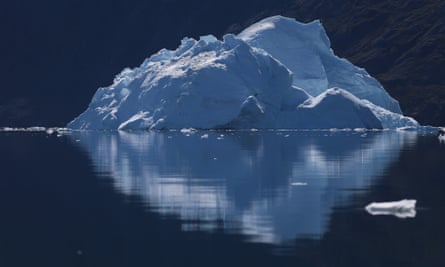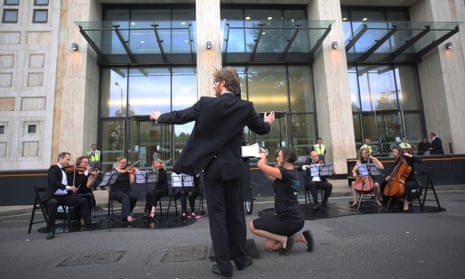Greenpeace this week began what they’re calling “a month-long run of Titanic-themed orchestral protests against Arctic drilling”. “Orchestral” might be overstating and also underselling it, since this isn’t really about full orchestras playing for Greenpeace, and although classical musicians are involved, there are also bagpipers and brass bands and many other musicians.
The Guardian’s product and service reviews are independent and are in no way influenced by any advertiser or commercial initiative. We will earn a commission from the retailer if you buy something through an affiliate link. Learn more.
But on Monday, outside Shell’s offices, the musical protest began with the Crystal Palace Quartet playing the four movements of Greenpeace’s Requiem for Arctic Ice, a multi-authored miscellany featuring new pieces by Nehemiah Luckett and Chris Garrard, and donated tracks by John Metcalfe and Rachel Portman.
Inspired by the string quartet that famously played as the Titanic went down, it’s the ice that felled the passenger liner that is precisely what is at risk – Shell’s drilling would only accelerate climate change in the Arctic, say Greenpeace. The NGO states on their website:
Shell are about to drill for oil in the Arctic. The last time they tried, they made dangerous mistakes and faced criminal charges. But drilling is just as risky now – the US government says there’s a 75% chance of an oil spill if Shell manages to extract oil. This oil must be left in the ground to avoid catastrophic climate change.
The tone of the music is soft-focused and lamenting; more interesting is the way Greenpeace have made the music reflect the changing – and increasing – wave of support for their anti-drilling campaign online, as this site for the musical protest will keep tolling its requiem until Shell is out of the Arctic.

Greenpeace’s campaign mobilises the power of music to accommodate meanings that we associate with the sounds we hear. Their “Requiem” is only about climate change and Arctic protest because of the context in which it is performed, and because of the titles the individual movements have been given (The Northernmost Part, Our Movement Rises, The Rig Approaches, And We Will Defend). Musically speaking, there are many more effective and more powerful pieces that make a meaningful connection between soundscape and landscape, and voice the anger and desperation that many composers feel about this looming ecological disaster we all face, as well as the wonder they experience when confronted by the power of natural forces at their rawest and most awesome. Here are six examples:
Brett Dean: Pastoral Symphony
The Aurora Orchestra’s performance at the Proms on 2 August revealed this piece as a furious cry against the deforestation of Dean’s native Australia, and the bird life that has been lost as a result. But whatever the inspiration, in performance the piece works as a single arc of desperate birdsong in conflict with man-made machines.
Tansy Davies: Re-greening
Currently in rehearsal with the National Youth Orchestra, Davies’s work will be an awakening of “an ebullient spring from her long winter slumber”. Performed from memory, the piece is a ritual of movement, song and instrumental music that will be unveiled at the Snape Maltings concert hall on Thursday, touring to Birmingham, the Proms and Berlin.
Peter Maxwell Davies: Symphony No 8, Antarctic
Davies’s symphony commemorates his journey into the Antarctic, and is an orchestral hymn to the wonders he encountered on his journey. He heard, on the boat south, “the ice crack and split before the bow, then roar along, keel to stern, in a tumultuous clatter of slabs and shards”. He also described the sound of an avalanche he saw as the ship passed between mountains of ice: “the mightiest, gentlest, longest whisper ever. It was a sound that seemed almost quieter than the silence that surrounded it”.
Vaughan Williams: Symphony No 7, Antarctica
Based on his score for the film Scott of the Antarctic, VW’s symphony is focused more on humanity’s vainglorious dominion over the elements in the dramatisation of Scott’s tragedy, but it’s also an evocation of the vastness of the Antarctic; a paean to an ice-scape that is now imperilled by humanity, rather than the other way round.
John Luther Adams: In the White Silence
A 75-minute work by Adams – often slow-moving, when not actually static – which creates a soundscape that takes on the character of a meditation in a physical landscape when you’re listening to it. It’s a piece that makes you part of the ecology of a musical landscape, a sounding metaphor for a deep engagement with the natural environment.
Chris Watson: Vatnajökull
The metaphor becomes real: the sounds of an Icelandic glacier that Chris Watson recorded and turned into a 18-minute sonic tone-poem for which the adjective “elemental” is absolutely accurate: Watson’s recording seems to puts you inside the ice, to make you part of the glacier’s heaving, cracking journey into the sea.

Comments (…)
Sign in or create your Guardian account to join the discussion